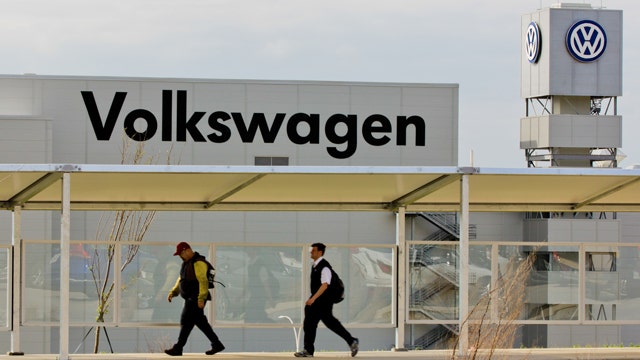Workers at the four-year-old Volkswagen plant in Chattanooga, Tenn., are taking part in a landmark vote this week on whether to organize under the banner of the United Auto Workers union.
Since it opened its doors, the VW assembly line has been a non-union shop in a state with strong right-to-work laws.
So – why the union, and why now?
The orders have come straight from company headquarters in Germany. Under pressure from the powerful IG Metall union, Volkswagen wants employees in the U.S. to join a so-called "works council."
Works councils are popular in Europe, and part of the VW culture. They’re a kind of partnership between the company and its workers that allows those on the assembly line to have a say in how the operation is managed.
For example, during the recession Volkswagen and its employees cooperated on strategies to weather the storm while avoiding mass layoffs. IG Metall isn’t happy that only three of VW’s plants don’t have a works council -- the facility in Chattanooga, and two in China.
Under U.S. labor law, workers can’t join a works council unless they belong to a union -- which is why Volkswagen invited the UAW to come in and hold a vote.
The move has sparked a battle over what opponents of unionization see as an expansionist tactic by the UAW to increase membership, dues and influence.
Leading the political charge is Republican Sen. Bob Corker, who as mayor of Chattanooga was instrumental in landing VW in the first place.
“The UAW has stated publicly, they cannot survive as an organization unless they are able to come down from Detroit," Corker said at a Chattanooga press conference Tuesday. "The key to survival was to come down to organize the plants in the southeast.”
The South is home to nearly a dozen foreign-owned non-union auto plants. In addition to Volkswagen, there is Mercedes-Benz, Hyundai and Honda in Alabama; BMW in South Carolina; Kia in Georgia; Nissan in Tennessee and Mississippi; and Toyota in Kentucky, Mississippi and Texas. The UAW has been trying to break into the South for a decade with no success. Many people fear if Volkswagen workers approve the union, it will be the first of many dominoes to fall.
“They will use the same techniques and they will press other companies to do the same thing as Volkswagen,” said Mallory Factor, a Fox News contributor. “This is a real test and this is a true test for workers’ freedom, and American competitiveness and the American worker.”
Outside groups have launched a vigorous campaign to defeat the union. The Center for Worker Freedom, an offshoot of Grover Norquist’s Americans for Tax Reform, has put up billboards in Chattanooga and is airing ads on the radio warning people that their city could become the next Detroit if the UAW gets in.
“I believe the history of this union shows that it’ll be a threat to both the jobs this plant has created in Chattanooga and the economic health of the community as a whole,” the center’s director Matt Patterson told Fox News.
Patterson’s group is also taking its message to the Internet, featuring testimonials from VW workers on why they don’t want to be part of the UAW.
One man speaks to quality: “We’ve made an award-winning car. On our own. With the current leadership that Volkswagen has provided. We did not need the UAW.”
A woman talks up the good relationship workers say they have with VW management in the current non-union environment.
“Right now, the perks that we get with Volkswagen are fantastic,” she says. “I don’t see how the union or the UAW could make any improvements in this area at all.”
The United Auto Workers has launched its own campaign to convince workers that union membership is the way to go.
In an Internet video, Chattanooga plant worker Justin King says, “Volkswagen will be stronger when they come together with the UAW because that combines not only Volkswagen’s history of working with labor, but it also adds in the UAW’s experience of working in the U.S. market.”
But some opponents believe Germany’s IG Metall union is actually pulling the strings, in an attempt to make the U.S. operations less competitive – and less likely to take jobs away from German workers.
“The UAW is fighting for its survival. And it’ll make a deal with anyone. It’ll make a deal with the devil,” Factor told Fox News. “This deal is going to be bad for America because we’ve now allowed Europe to be really involved with our manufacturing and our workers.”
Lawmakers in Tennessee have issued dire warnings to Volkswagen of what might happen if it goes union. Republican state Sen. Bo Watson says the company might miss out on much-needed incentives.
Watson told a pre-vote press conference, "I believe any additional incentives from the citizens of the state of Tennessee for expansion or otherwise will have a very tough time passing the Tennessee Senate."
While U.S. law requires that workers must be union members to participate in a works council, it does not stipulate which union they must join. It could be the UAW, or it could be a separate union employees themselves form.
Ultimately, the final say is with the workers, and 1,570 of VW’s 2,500 employees in Chattanooga are eligible to vote. Three days of balloting ends Friday at 8:30 p.m. local time.











































